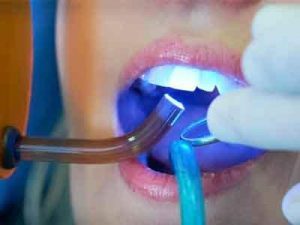- Home
- Editorial
- News
- Practice Guidelines
- Anesthesiology Guidelines
- Cancer Guidelines
- Cardiac Sciences Guidelines
- Critical Care Guidelines
- Dentistry Guidelines
- Dermatology Guidelines
- Diabetes and Endo Guidelines
- Diagnostics Guidelines
- ENT Guidelines
- Featured Practice Guidelines
- Gastroenterology Guidelines
- Geriatrics Guidelines
- Medicine Guidelines
- Nephrology Guidelines
- Neurosciences Guidelines
- Obs and Gynae Guidelines
- Ophthalmology Guidelines
- Orthopaedics Guidelines
- Paediatrics Guidelines
- Psychiatry Guidelines
- Pulmonology Guidelines
- Radiology Guidelines
- Surgery Guidelines
- Urology Guidelines
An end to cavities for people with sensitive teeth?

An ice cold drink is refreshing in the summer, but for people with sensitive teeth, it can cause a painful jolt in the mouth. This condition can be treated, but many current approaches don't last long. Now researchers report in the journal ACS Applied Materials & Interfaces the development of a new material with an extract from green tea that could fix this problem and help prevent cavities in these susceptible patients.
Tooth sensitivity commonly occurs when the protective layers of teeth are worn away, revealing a bony tissue called dentin. This tissue contains microscopic hollow tubes that, when exposed, allow hot and cold liquids and food to contact the underlying nerve endings in the teeth, causing pain. Unprotected dentin is also vulnerable to cavity formation. Plugging these tubes with a mineral called nanohydroxyapatite is a long-standing approach to treating sensitivity. But the material doesn't stand up well to regular brushing, grinding, erosion or acid produced by cavity-causing bacteria. Cui Huang and colleagues wanted to tackle sensitivity and beat the bacteria at the same time.
The researchers encapsulated nanohydroxyapatite and a green tea polyphenol epigallocatechin-3-gallate, or EGCG in silica nanoparticles, which can stand up to acid and wear and tear. EGCG has been shown in previous studies to fight Streptococcus mutans, which forms biofilms that cause cavities. Testing on extracted wisdom teeth showed that the material plugged the dentin tubules, released EGCG for at least 96 hours, stood up to tooth erosion and brushing and prevented biofilm formation. It also showed low toxicity. Based on these findings, the researchers say the material could indeed be a good candidate for combating tooth sensitivity and cavities.
For more details click on the link : Jian Yu, Hongye Yang, Kang Li, Hongyu Ren, Jinmei Lei, Cui Huang. Development of Epigallocatechin-3-gallate-Encapsulated Nanohydroxyapatite/Mesoporous Silica for Therapeutic Management of Dentin Surface. ACS Applied Materials & Interfaces, 2017; DOI: 10.1021/acsami.7b06597

Disclaimer: This site is primarily intended for healthcare professionals. Any content/information on this website does not replace the advice of medical and/or health professionals and should not be construed as medical/diagnostic advice/endorsement or prescription. Use of this site is subject to our terms of use, privacy policy, advertisement policy. © 2020 Minerva Medical Treatment Pvt Ltd